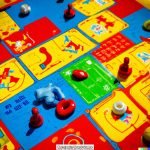Introduction to Monopoly Junior
Monopoly Junior is a board game designed for children ages 5-8. It contains the same basic rules as Monopoly, but it has been modified to be easier and more fun for younger players. Each player starts with a certain amount of play money based on their age, such as ,10 or ,20. Players must then choose one of four customizable pieces – such as an animal, car or game token ” which move around the board. Just like in the classic version, players can buy properties, build homes and hotels, collect rent from other players and master their finances. The layout of the board is much simpler than the adult version and there are fewer properties, making it easier for kids to understand. Of course no Monopoly game would be complete without Chance cards, which can help players or land them in jail! Players compete to be the first one to fill up their bank by buying up various properties and collecting rent from opposing players. With its eductaional content encouraging critical thinkinbg and money management skills, Monopoly Junior is sure to provide hours of entertainment for young gamers.
Benefits of Monopoly Junior
The Monopoly Junior board game is a great choice for children because it encourages creativity and collaboration through its fun and creative play. Through the game, kids practice making decisions, strategizing, and counting money which enhances their problem-solving skills. It also helps to develop social skills as multiple players need to work together in order to reach their own individual goals, as each one of them has different options on how to get there. Moreover, Monopoly Junior introduces children to the concept of buying and trading properties while stressing the importance of playing nicely with others. With such a wide Scope of learnings that stems from the game, no wonder why this particular board game has been such a classic over the years!
Gameplay
Monopoly Junior is a simplified version of the classic board game for young players. The main objective of the game is to be the player with the most money and property at the end of the game.
To begin, all players choose one of four cool junior tokens such as car, ice cream cone, dolphin or a duck and place it in front of them on Start. Players then take turns rolling two dice to determine how far they move their pieces along the path around the board. After each player has had a turn, players can purchase properties such as an amusement park or beach which they land on if they are available or put up an auction if they are not. When you own all properties in a color group, you can build houses or hotels on them to increase rent prices so that when other players land on those properties, they have to pay more money to you.
Besides buying and building on properties, there are also surprises around the board like rewards for passing go; getting caught going too fast in school; stopping for fuel; collecting money from your friends plus many more! As play progresses, each time a player lands on one another’s property, he needs to pay rent to his opponent based on what’s printed on the square. When a player runs out of money and can no longer pay due rent owner may make other arrangements such as one side trading property with another side instead of paying rent. After all Monopoly money has been exchanged by more than one person and all other transactions has completed, whichever player left with most amount of cash wins the game!
Strategies
Building Houses
One strategy when playing Monopoly Junior is to build houses. Building houses can help you accumulate more money and increase your rental income. To succeed in building the houses, you should know their different values and what cards they require. You will also want to make sure you always have enough money left over to pay rent once a house is built. Furthermore, try to focus on purchasing multiple properties of the same color group, as this offers access to building up faster. On these multiples properties, “two” and “three” house symbols on other properties gives people one extra move for every time it is landed on by a fellow player (known as “token speed”).
Forming Alliances
Another way of winning Monopoly Junior is through forming alliances with other players. This increases your chance of success strategically; if multiple players work together and land on each other’s properties instead of randomly landing elsewhere, the players will be able to make more money. Additionally, having knowledge about how the game works allows players to communicate and create new strategies that could lead them closer towards victory.
Implementing Special Actions
Action cards are an important part of Monopoly Junior as they allow players use special abilities throughout the game such as moving ahead or doubling their cash income without paying taxes or landing back at “Go” which results in bonus payments from the bank. Knowing when and which actions cards should be used accordingly can drastically aid a player’s progress in-game since it saves them time usually spent navigating through all the properties around the board while giving bonus rewards. In order to maximize its benefit, such action cards must be implemented effectively with vigilant attention paid towards possible rental fees or opposing player moves during a turn. It pays (figuratively) to take advantage of these beneficial action cards whenever it presents itself within the goal of winning above all else!
Creative Variations
One way to spruce up a Monopoly Junior board game is to create random cards for players. These cards can either contain benefits like money or properties, or consequences such as payment of a fee. Position the jail space somewhere in the center section of the board from which these cards should be picked once a player lands on it, replacing the need to pass ‘go’ three times as normally seen in regular games. For an added twist, have some cards that describe secret tasks that need to be fulfilled in order to gain extra rewards e.g. complete a lap around the board or kiss somebody living at the Bank square.
Another creative variation is to introduce awards which can be distributed among all players at certain points during the course of the game e.g. when someone purchases his/her first property or whenever somebody throws doubles with their dice roll. Players could also receive extra money allocated by The Banker if they complete specific objectives that pertain to each award (e.g. buying threehouses on one street).
Finally, customize The Bank’s balance cap by setting higher maximums and tops-offs instead of using only fixed amounts available in usual game packs for purchase so that all transactions are worth more relative to other players who may not own expensive properties or many houses and hotels yet since this allows for better reward opportunities regardless of how much money each player has acquired so far iand will encourage more competitiveness throughout playtime .
Challenges and Rewards
The Monopoly Junior Board Game is sure to provide a fun and interesting experience for kids of all ages. In addition to the classic play of buying, trading and building properties, there are also unique tasks and challenges that can be completed in order to add more excitement to the game. Kids can build towers from their property cards, race through winding paths across the board to reach predetermined goals, and make trades with other players as they move around on their journey. Monopoly Junior also encourages cooperation amongst players by allowing them to share rewards for completing tasks successfully; this helps guide young minds toward understanding good sportsmanship and fair play. Ultimately, this game supplies hours of entertainment coupled with life lessons about managing finances, developing creative solutions, and working together towards a common goal.
Different Versions
The Monopoly Junior board games have been around since the late 1980s. Different versions of the game have been released over the years, including themed editions such as Frozen, Hot Wheels, and Teenage Mutant Ninja Turtles. The original version of Monopoly Junior features a simplified version of the classic game. Players roll dice to move around the game board buying and trading properties. Some of these properties include places like an ice cream shop and pizza parlor that are unique to the junior game version. Newer versions feature additional pieces such as pigs, cows, and chickens as well as money that is divided by $1 bills and coins for younger players.
In addition to classic board games, there are also several digital editions available on platforms such as iOS, Android and Amazon Fire devices. Monopoly Junior Game has also released expansions packs that include extra cards or tokens to enhance gameplay. Some common expansion editions include additional characters like Emojis or Zombies which add more variety to the already established gameplay of Monopoly Junior. Players can also choose their color pieces or use new pieces if they own an expansion pack to customize their gaming experience even further.
Accessibility Options
The Monopoly Junior board game is designed to be accessible to players of all abilities, so it can easily be played with assistive technology. Players can use touchscreens and voice-activated commands to control their turns and place pieces on the board. Audio cues can be used to indicate when a player moves forward or back on the board and when they pass go. Tactile cards, like Braille versions of Community Chest and Chance cards, can also be used in place of traditional cards. Sensory features such as bright colors and tactile game pieces can be used to make playing the game more engaging for all players. With these adaptions, children who rely on assistive technology will be able to join in the family Monopoly fun!
Final Thoughts
The Monopoly Junior board game is the perfect way to introduce young children to the beloved classic. With familiar rules, simplified game pieces, and dynamic currency playing cards, kids can enjoy and learn a good old-fashioned real estate negotiation. While the rules are straightforward, there’s plenty of room for creativity ” Funky new house names, special dances when landing on Go, or even throwing in a wager or two into the mix. While it may be impossible to make Monopoly newer and fresher than it already is, parents and teachers can create unique ways to inspire an interest in the game for every play session. Consider assigning each role with different colored hats, rotating game pieces between participants for an extra challenge, or players having to draw out their own money at certain points during the game. These twists on an old favorite will keep kids engaged and playing all night long!

I love playing all kinds of games – from classics like Monopoly to modern favourites like Ticket to Ride.
I created this blog as a way to share my love of board games with others, and provide information on the latest releases and news in the industry.





